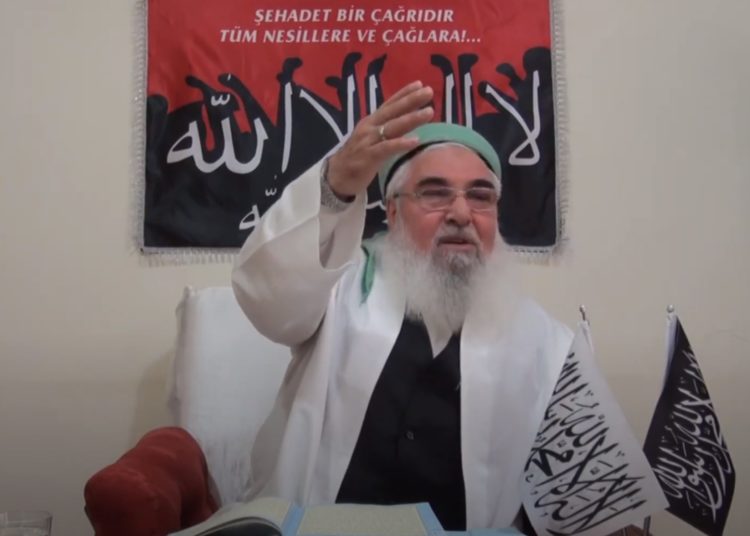Abdullah Bozkurt/Stockholm
The leader of a jihadist group known as Vasat, listed as a terrorist entity in Turkey for bombing a Bible publishing house and killing an innocent boy, resumed his activities after he was freed from jail by the government of President Recep Tayyip Erdoğan.
Şahimerdan Sarı, a 61-year-old extremist cleric who was convicted twice and served time on terrorism charges, has been rebuilding his jihadist network in Turkey’s border provinces near Syria, a Nordic Monitor investigation has found.
Şahimerdan started preaching again, holding private meetings to spread his venomous ideology, raising funds and recruiting new followers after his release on June 17, 2019 with a government-orchestrated move that came after a campaign by his followers ahead of local elections in 2019. The Supreme Court of Appeals (Yargıtay) 16th Chamber, which was staffed with Islamists and nationalists after a mass purge of the nation’s highest criminal court in 2016, ruled for his acquittal in clear contradiction to two of its own rulings in the past that upheld Şahimerdan’s convictions.
Although the Vasat group mainly operated out of Gaziantep, a province where many Islamic State in Iraq and the Levant (ISIL, ISIS, or Daesh) militants operated various cells, it has also been active in Turkish provinces such as Adana, Adıyaman, Kahramanmaraş, Şanlıurfa and Osmaniye, where Kurds represent a sizable part of the population.
Some Vasat members later joined ISIS as well. According to a police record dated October 25, 2015 in Mersin, police informant Ahmet Toprak, who was involved with Vasat, said two ISIS suicide bombers who executed a deadly terrorist attack on October 10, 2015 near the Ankara train station and killed 109 people were in fact nurtured in the Vasat group.
The Supreme Court of Appeals 16th Chamber’s ruling in 2019 that overturned prior rulings of top criminal courts designating Vasat as a terrorist group:
The cleric made a name for himself when he was working for the Diyanet, the government’s religious authority, in 1986 and preaching at the central mosque in Turkey’s border province of Gaziantep, all at the expense of Turkish taxpayers. He resigned in 1995 and set up his own network, initially under the name of Şahimerdancılar and later as Vasat in 1996, when the group started publishing a magazine under the name of Vasat.
The group advocates the toppling of the secular republic in Turkey and replacing it with a theocratic regime in four stages that were described as educational activity (ilim), conveying and preaching (tebliğ), community building (cemaat) and Islamic revolution (İslam devrimi). It has been raising funds through donations from its followers not only in Turkey but also in Germany, where a large Turkish Muslim diaspora lives, proceeds from the sale of its publications and charitable Islamic givings such as Zakat and Fitre.
Şahimerdan urges his followers to refuse to pay taxes, serve in the military, enroll children in school or vote in elections. He views Turkey as Dar al-Harb, which means the war territory infidels still rule. He said he is staunchly opposed to interfaith dialogue, despises the Alliance of Civilizations project and rejects any tolerance of or compromise with non-Muslims.
The first deadly attack Vasat carried out was in 1997, when it bombed a bookstand operated by the Müjde Publishing House, which was selling Bibles in Gaziantep, on Sept. 14, 1997. A 4-year-old boy identified as Ali Özdemir was killed and 23 others were injured in the attack, which was perpetrated by Şahimerdan followers Burhan Kaba and Mehmet Kurt, who tossed a hand grenade into the crowd.

The police crackdown on Vasat in the aftermath of this violent incident resulted in the arrest of Şahimerdan and operatives identified as Mehmet Yıldırım, Hasan Gölgeli, Zabit Durmuş, Imam Yaşar Yavuz, İsa Bozkurt, Cemal Güçlüer, Imam Hasan Çomak, Imam İrfan Gülmüş, Kemal Güçlüer, Mehmet Karaca, Faruk Öztürkoğlu and Nusret Reçber.
During a search of the suspects’ homes and offices, police found seven hand grenades, a gun, two automatic rifles and explosives material. The then-governor of Gaziantep, Muammer Güler, told the press that suspects Kaba and Kurt scouted the book fair and spotted a stand that was selling Bibles. The two later informed Mehmet Yıldırım, responsible for the armed wing of Vasat, about the target, received approval and later left the city after the bombing.
Şahimerdan was convicted on September 8, 1998 after a trial at the Adana State Security Court on terrorism charges. He was sentenced to 18 years, six months in prison, and the verdict was upheld when Vasat was recognized as a terrorist group on June 28, 1999 with decision No.1995/2873 of the 9th Chamber of the Supreme Court of Appeals.
With its leader in jail and the crackdown on its cells, Vasat remained in disarray until December 31, 2000, when a police raid on a safe house used by Vasat offshoot the Islamic Jihad Movement in Turkey (Türkiye’de İslami Cihat Hareketi). Police counterterrorism chief Ali Osman Sarıçalı was killed in a gunfight during the raid. Turkish authorities intensified the crackdown on Vasat after the deadly shooting and conducted 35 police operations throughout the years.
While Şahimerdan was in prison, a caretaker named Çetin Yıldırım managed the network, but he was detained as well on December 21, 2004 along with five other operatives.

After his release on parole in March 2007, Şahimerdan did not lie low but rather returned to his jihadist business under a front association called Şahid-Der. The police detained him and 52 others two years later, on April 27, 2009. On Dec. 19, 2011 the Adana 7th High Criminal Court convicted him, his two sons and 11 others on terrorism charges.
As a result of the trial proceedings, Süheyl Sarı, Muhammed Sarı, Mehmet Yılgın, İzzettin Avcı, Resul Bulanık, Abdullah Doğan and Aydın Yalman, who were sentenced to six-and-a-half years, were sent to a prison in Gaziantep. Şahimerdan was also sentenced to 12 years, six months. When he was released pending appeal, Şahimerdan fled to Arbil in Iraq’s Kurdistan region and became a fugitive. İsmet Yener, Mehmet Bilici, Abdullah Tuncer, Ahmet Balki and Orhan Çelik, also convicted, remained at large.
Turkey’s Supreme Court of Appeals upheld Şahimerdan’s second conviction on April 11, 2014. His appeal on rights violations filed with the Constitutional Court was also rejected. Şahimerdan fled to Germany first and then to Iraq’s Kurdistan region until local authorities put him under surveillance and eventually in detention. His followers and al-Qaeda-affiliated Turkish groups launched a campaign to bring him back to Turkey and secure his release.
For example, the Jabhat Nusra-affiliated Öncü Nesil Humanitarian Relief Association (Öncü Nesil İnsani Yardım Derneği), whose members were investigated and arrested only to be released after meddling in the case by the Erdoğan government, issued a statement on August 4, 2016, saying that the cleric Şahimerdan was a victim of Christian crusaders as well as Turkish Muslim scholar Fethullah Gülen, a champion of interfaith dialogue and vocal critic of armed and violent jihadist groups. The statement praised Şahimerdan as a jihadist and called for his release as soon as possible.
The group’s lobbying efforts with the Erdoğan government eventually paid off. The cleric was even featured in an exclusive interview on A Haber TV, owned by President Erdoğan’s family, on September 19, 2014 when he was on the run from the law. The channel portrayed him as an innocent man who got into trouble because he was critical of President Erdoğan’s outspoken critic Gülen, who has been living in the US since 1999. During the program Şahimerdan repeated his opposition to interfaith dialogue and called Gülen an infidel.
The decision for Vasat’s acquittal issued by the Supreme Court of Appeals was sent to prisons to pave the way for the release of the convicted jihadists:
On February 13, 2018 Şahimerdan was deported to Turkey, where he was sent to jail until the government freed him a year later. Although he had no right to appeal since he had already exhausted all the appeals processes in Turkey, the Supreme Court of Appeals prosecutor, under government orders, initiated a procedure to toss out the convictions of Şahimerdan and asked the Supreme Court of Appeals to go against its own precedents in his case. In a bizarre ruling the 16th Chamber vacated the conviction rulings and acquitted Şahimerdan of all charges on June 17, 2019.
The 16th Chamber sent the notice to the prosecutor’s offices in Istanbul, Gaziantep and Adana, where convicted Vasat members were imprisoned and asked them to release Şahimerdan and 14 other convicts from prison.
In the meantime Erdoğan has also punished judges and prosecutors who were involved in the criminal prosecution and trials of Şahimerdan and his Vasat group, sending a chilling message across the board to the Turkish judiciary.
Zeka Kayalı, the presiding judge who served at the Adana 7th High Criminal Court and oversaw the Vasat trials from February to December 2011, was one of the judges on the panel that convicted and sentenced the Vasat leader. He was later demoted and assigned to a different court before he was suspended. He was detained on July 16, 2016 along with 2,745 judges and prosecutors and later formally arrested and put in jail.
Müslüm Uzun and Cuma Afşar, judges at the Adana court where the Vasat case was tried, were investigated in December 2015 and arrested in July 2016. Turkish prosecutor Ahmet Mithat Temel, who investigated Vasat, was also arrested in July 2016 and has been in pretrial detention since then. Ekrem Ertuğrul, the president of the 9th Chamber of the Supreme Court of Appeals, and judges Ahmet Toker, Fikriye Şentürk and Abdurrahman Kavun of the same chamber, who upheld the conviction of the Vasat members, were also arrested in July 2016 and jailed.












